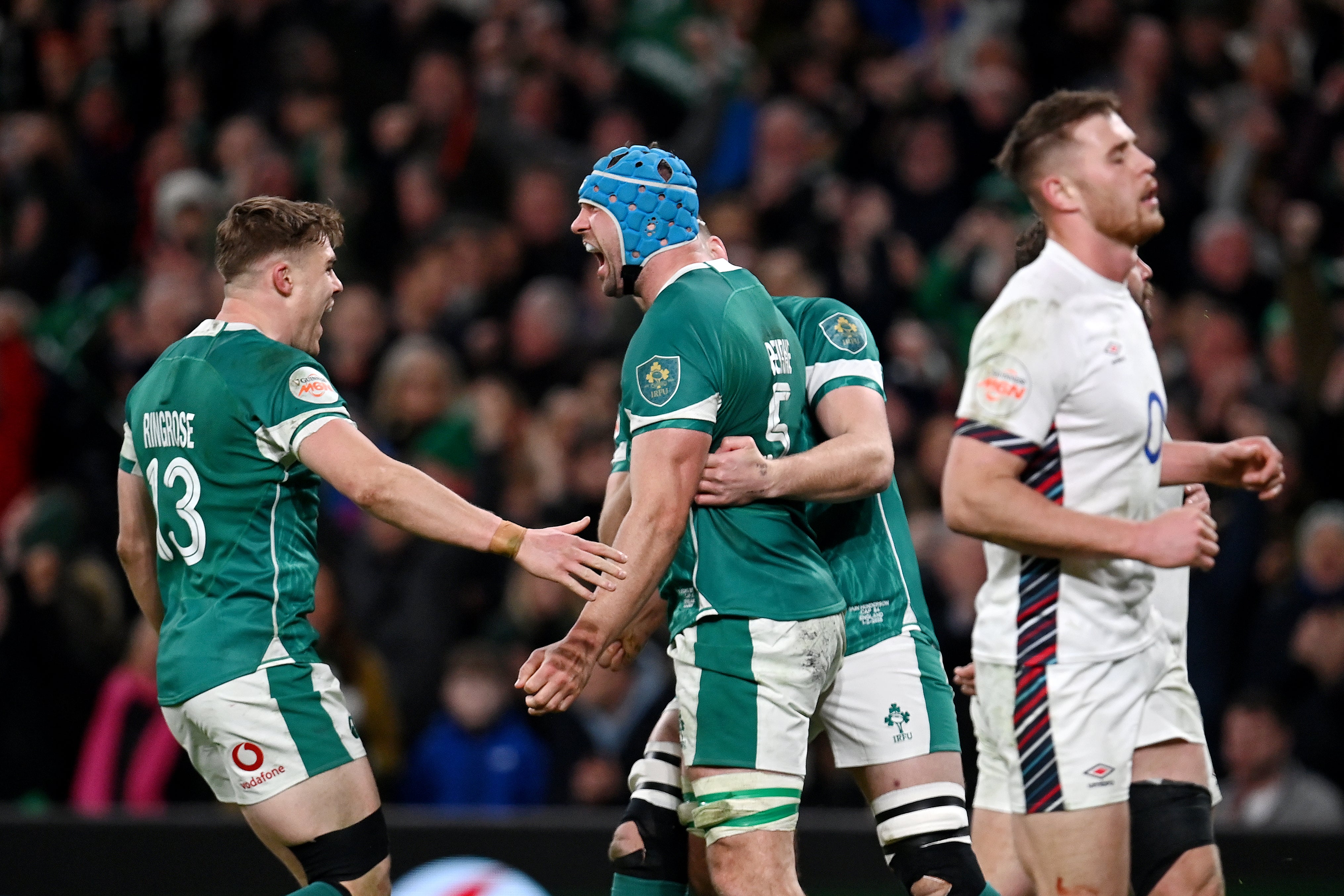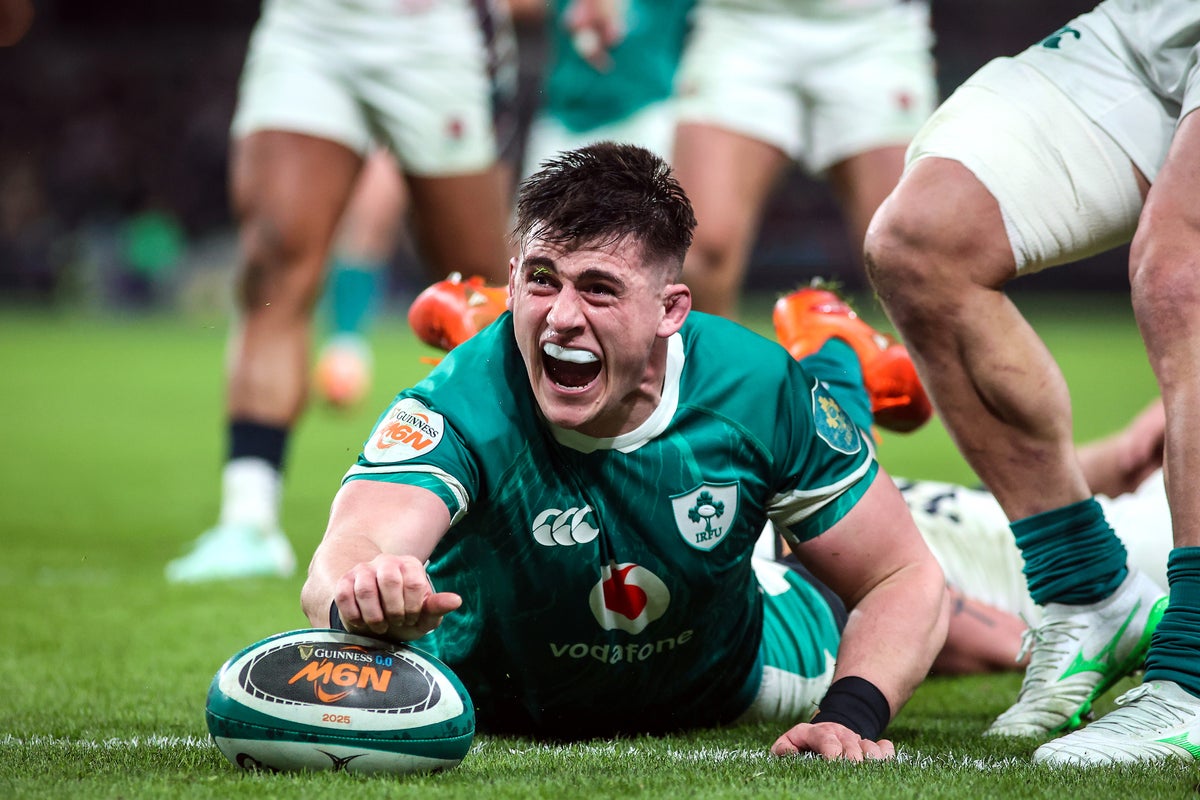With a new hand at the helm, the good ship Ireland is sailing successfully again. Off in search of treasure Simon Easterby’s side embarked with victory over England; there is plenty that must be navigated before the twice defending champions begin to truly contemplate an unprecedented third consecutive Six Nations crown, but this was an excellent start.
England had rocked their winning vessel in the first half with defensive zeal but there felt little doubt that an Ireland side used to rough seas would eventually emerge on top. Away they accelerated at a rate of knots to start the Easterby era with a victory made narrow by two late English tries but decided long before.
Watching on from the stands as he prepares for British and Irish Lions business, Andy Farrell’s loyalties might have been rather more split than usual, but the temporarily unavailable Ireland boss would have been quietly pleased. Entrusting his first mate with the care of a winning squad, this looked very much like the Ireland of the last couple of years – keeping cool and calm even in England’s brighter patches to set off in the right direction in their hunt for history.

While Easterby smiled, in the opposite coaching box Steve Borthwick cast a familiar scowl. The recurrent issues of November appeared again for the England head coach, his charges producing an outstanding first 40 minutes but not able to sustain their effort. Ahead 10-5 at half time, 22 unanswered points from the hosts put the game away. Two months of consideration and contemplation have not aided Borthwick in his search for second half solutions. They may take the positives of a back-door bonus point yet at some point the wins must come.
So much had gone right for the visitors before then, too – starting with an opening ten minutes that went exactly to their preferred script. Going early and often to their kicking and contesting game, Freddie Steward tapped back the opening hoist to spark a series of aerial successes and ensure England were playing in precisely the right areas.
It was Ireland that showed the early ambition, attempting to get outside England’s pared-back blitz defence repeatedly but failing to do so, one excellent tackle from Itoje on Lions captaincy rival Caelan Doris particularly key. That helped afford Cadan Murley the opportunity to mark a dream start to his international career. The chance was created by England’s centres, each showing their contrasting strengths: first Ollie Lawrence surging up the middle with his blend of burst and biff, before Henry Slade’s beautifully-weighted grubber through gave Murley the simple score.
Ben Earl’s shelling of the resultant restart was about the first error that England had made. Yet soon they found themselves on a disciplinary warning, their attempts to scavenge and stifle at the ruck in their own 22 drawing the ire of referee Ben O’Keeffee.
Ireland almost capitalised, Ronan Kelleher collecting a loose ball and making unimpeded passage to the line, only for Itoje’s first telling intervention as England captain. The lock alerted the officials to a piece of ruck skulduggery, the confirmation of which by the TMO saw the try chalked off.
Yet it felt like England would pay at some point for their continuous infringing. It came nine minutes later after the rangy Ryan Baird broke up the right to within five metres of the visitors’ line. Two Englishmen could have been shown a yellow card for cynical offences; O’Keeffe dispatched the second of them, Marcus Smith, to the sin bin.
Down a body, England’s defence was being forced to strain every sinew to contain an Irish side beginning to find their flow in phase play. Young fly half Sam Prendergast had been boldly selected ahead of Jack Crowley and grew into his Six Nations debut, the 21-year-old orchestrating some nice shapes but just unable to put the right pieces together when Ireland made inroads.
Having survived nine minutes of Smith’s stint on the naughty step, England will have been desperately disappointed that individual errors ended Ireland’s duck. Alex Mitchell had enjoyed a superb half, proving again why he is now one of his side’s most important performers, but a simple spot tackle on James Lowe should have been made. Away went the wing with piston-limbs pumping before finding Jamison Gibson-Park with an inside pass to set up a one-on-one with Steward. The Leicester full-back has a great many strengths but his lateral agility is not one of them – there are cargo ships in Dublin Port quicker on the turn – and Gibson-Park stepped him with relative ease.
Smith returned and knocked through three to close a half that would have contented Borthwick and defence coach Joe El-Abd, a slightly less aggressive linespeed system just about holding firm. The obvious question, though, was whether it, and England, could stay the course after the recurring late missteps that were the motif of 2024.
Backs by now firmly against the wall, England chose fight rather than flight, a bit of niggle emerging as Ireland grew frustrated. Lacking their usual accuracy and aplomb in advanced areas, two more opportunities came and went. But Bundee Aki showed the way, levelling the scores with a fine finish that saw him plough past each of Smith, Mitchell and Tommy Freeman. Soon after, Prendergast’s clean strike nudged Ireland into their first lead.
A beefed-up bench had been named by Borthwick in the hope on improving on the unit’s limp November efforts, Tom Willis among the first of the replacements to be used after irresistible form for Saracens earned the one-cap number eight a recall. Ireland went to their reinforcements, too, as Crowley stepped in for Prendergast.
And it was, unsurprisingly, Ireland who produced the telling second-half surge. England’s fringe defence had falted repeatedly in their autumn failings and did so again here, Lowe arriving from deep to exploit the space between Ellis Genge and Chandler Cunningham-South. Tahdg Beirne went with the wing to collect and score.
Suddenly England were falling familiarly to pieces. Murley and others showed their inexperience with key errors deep in their own half; substitute scrum half Harry Randall contrived to send a box kick backwards. Lowe, increasingly a force of nature, accelerated on to Dan Sheehan’s gorgeous rainbow pass to cut England again, returning the favour with an inward pop that the hooker, back ahead of schedule from a serious knee injury, transported to the line. Late tries from Tom Curry and Freeman narrowed the final margin but the game had long since gone.

